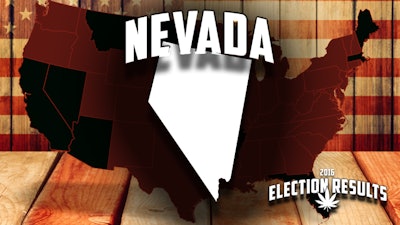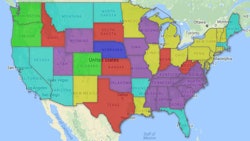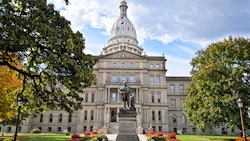
Recreational cannabis is now legal in Nevada.
Nevadans voted “yes” on Question 2, the Regulation and Taxation of Marijuana Act, 54 percent to 46 percent.
This measure has been a long time coming for the Silver State. Recreational marijuana initiatives have made regular appearances on the state’s ballot since 2002, when a measure seeking to decriminalize the possession of cannabis was quashed. A full legalization ballot measure was also brought to voters in 2006, and was defeated by a margin of 10 points.
This time around, voters passed the measure by nearly 100,000 votes.
“We are thrilled that the people of Nevada have put an end to the failed policy of marijuana prohibition,” says Coalition to Regulate Marijuana Like Alcohol spokesperson Joe Brezny.
“The state now stands to create jobs and generate millions in tax revenue by bringing the existing market for cannabis aboveground,” says Tom Angell, Chairman of Marijuana Majority, a national pro-cannabis organization.
Angell isn’t wrong about the state generating tax revenue. A recent projection by New Frontier Data estimates that Nevada’s cannabis market will grow to nearly a half billion dollars by 2020.
Brezny also added that his group plans to continue shaping the state’s marijuana policy.
“As we move forward, we look forward to working with legislators and regulators to ensure that this system is regulated in a manner that benefits consumers and enhances public health,” he said.
The measure takes effect on Jan. 1, 2017, and state regulators from the Department of Taxation will have 12 months to adopt all the rules and regulations needed to implement the act. This means recreational cannabis businesses can open in Spring 2018, at the earliest, as the Department is given a 90-day window in which to review and reply to any license application.
When the application window opens, the only applications that will be reviewed will be those from already licensed medical operators. According to the measure, “for 18 months after the Department begins to receive applications for marijuana establishments, the Department shall only accept applications for licenses for retail marijuana stores, marijuana product manufacturing facilities, and marijuana cultivation facilities … from persons holding a medical marijuana establishment registration certificate.” (https://www.regulatemarijuanainnevada.org/full-initiative-text/#sthash.mHj4EdjA.dpuf)
Retail stores will also be capped relative to county populations. A maximum of 80 licenses will be awarded to counties with over 700,000 residents, 20 for those with populations between 100,000 and 700,000, 4 to counties with populations between 55,000 and 100,000, and 2 for counties with populations under 55,000. There is no mention of caps for cultivation businesses.
While the measure is not as exhaustive as California’s, it does offer guidance to prospective business owners on how to complete an application and lays out the licensing fees structure. For example, a cultivation license will cost $30,000 to obtain, and yearly fees of $10,000 are required to renew it. This is on top of the $5,000 application fee to be included with all submissions.
The measure also introduces a 15 percent excise tax on all cannabis sales in addition to any state and local sales taxes that already exist or will be created. This is a significant increase from the 2 percent excise tax placed on medical cannabis.
Tracking cannabis products is also going to be much stricter than on the medical side. State Sen. Tick Segerblom, a Las Vegas Democrat and proponent of the measure, said in an interview with the Las Vegas Review-Journal that recreational cannabis requires barcode trackers, as opposed to medical cannabis, which does not. For dispensaries looking to serve both medical patients and recreational users, Segerblom simply said they “could divide the store.”
There is also room for counties and cities to essentially “zone” the program out of existence within their municipalities. Although not allowed to completely outlaw recreational cannabis, the initiative does not does not prohibit “a locality from adopting and enforcing local marijuana control measures pertaining to zoning and land use for marijuana establishments.”
The measure legalizes the possession of up to an ounce of dried marijuana and an eighth of an ounce of concentrate. It also legalizes home grows of up to 12 plants.
Read the full measure here


























